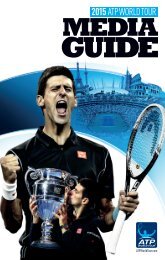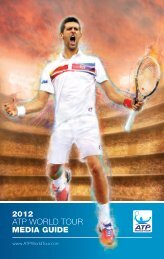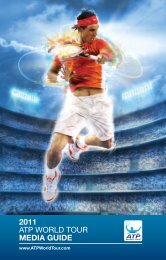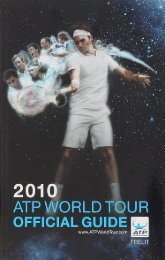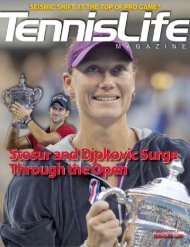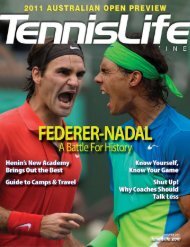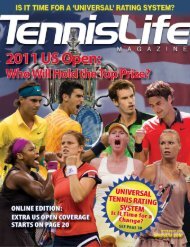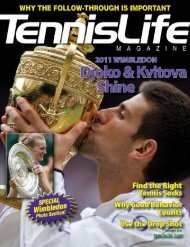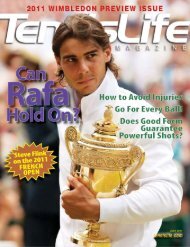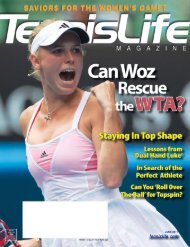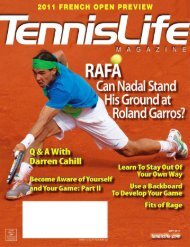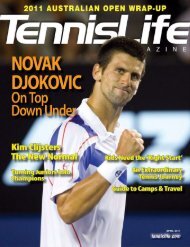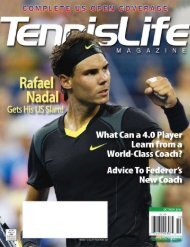A Champion's Mind - Pete Sampras
www.tennismoscow.me Insta:TENNISMOSCOW
www.tennismoscow.me Insta:TENNISMOSCOW
Create successful ePaper yourself
Turn your PDF publications into a flip-book with our unique Google optimized e-Paper software.
that sixth straight year-end number one ranking. I played seven post–U.S. Open events in Europe in the fall<br />
in an attempt to hold off Marcelo Rios, who was making a big push for the top ranking. At the start of the<br />
year, I had no intention of playing some of those events (Vienna and Stockholm pop right to mind), but I<br />
ended up asking for wild cards into them. As the year progressed, Rios kept closing on me, and I became<br />
borderline obsessed with the record.<br />
The European circuit in the fall is no picnic, even at the best of times. It’s cold, it gets dark early, and<br />
you’re playing night matches in massive arenas under artificial lights. At the end of the long, hard Grand<br />
Slam season, that ambience can leave you feeling like you’re living in some strange, parallel universe.<br />
That last big push to secure the record started on a down note when I lost to Wayne Ferreira at Basel. I<br />
bounced back and won Vienna. I pulled out of Lyon with a minor injury, but then lost a heartbreaker of a<br />
semifinal (in a third-set tiebreaker) at Stuttgart to Richard Krajicek. To make matters worse, I could have<br />
clinched the year-end number one ranking by winning that event.<br />
So it was onto Paris, which is where I started to lose it a little bit. The general fatigue that contributed<br />
to my inconsistent results was starting to get to me at a deeper, psychological level. The stress was<br />
causing my hair to fall out in clumps. Yet nobody in the States seemed to care—there wasn’t a single<br />
reporter representing a U.S. newspaper or magazine covering this drive. By contrast, the European press<br />
was all over it. It was the dominant story of the fall season, and it just brought that much more pressure to<br />
bear on me.<br />
Finally, realizing that I just couldn’t internalize it all any longer, I called Paul’s room in the hotel from<br />
my own and asked him to come by. This was a watershed moment for me, because I had never before<br />
showed the kind of vulnerability I was about to exhibit. Paul came into my room, wondering what was up.<br />
I confessed, “Paul, I’m struggling here. I feel like I need a therapist or something. This race is so close,<br />
I’ve worked so hard to get this record, but I’m thinking these crazy things, like, What if I don’t get it? How<br />
am I going to deal with that?”<br />
Paul looked at me, dumbfounded. It wasn’t an easy situation for him—it ran utterly counter to the<br />
relationship we had established over many long years. He didn’t know what to say at first, but in reality,<br />
he didn’t need to say anything at all. I was the one who needed to say things—I just had to articulate and<br />
off-load all that anxiety. I explained that this was an emotional thing I was going through. I felt this huge<br />
sense of pressure, a different kind than I had felt trying to win a major title, or as I closed on Emerson’s<br />
record. I dreaded what might happen if I didn’t get the record. What was there to dread? Good question.<br />
There was a sobering practical dimension to this, though. My effort to set a new mark was six years in<br />
the making, and if I failed, it wasn’t like I could try again the following year. This was the most all-ornothing<br />
situation I’d ever been in; if I didn’t accomplish my goal, it would be a career shortcoming that<br />
was bound to haunt me for life, and more rather than less because I had come so close to achieving it.<br />
This hunt had grown into an obsession; it became a weight I carried around in my chest all fall, getting<br />
heavier and heavier. Eventually, I needed to exhale.<br />
Paul took that information and went and thought about it, and then set about getting me ready to run the<br />
last leg of the race. It’s not like there was a lot he could do, but understanding how much I had tied myself<br />
in knots over this would lead him to maybe deal with the situation on his end a little differently. Basically,<br />
Paul provided a place where I could go to be vulnerable, and his quiet encouragement and understanding<br />
of what I was going through were very welcome. I felt better after talking with him. To the extent that I<br />
needed an emotional anchor—an unfamiliar need, for me—he became it.<br />
None of this had anything to do with the tennis part, the forehands and backhands, even though I was<br />
playing tired, erratic tennis—up one day, down the next. However, the ATP was trying to capitalize on the<br />
story, ostensibly for my benefit as much as theirs. They were asking me to do all these interviews,<br />
including prime-time European news and chat shows. That was just what I needed—to waste my energy<br />
and downtime in the evenings going on chat shows with the French Larry King.




